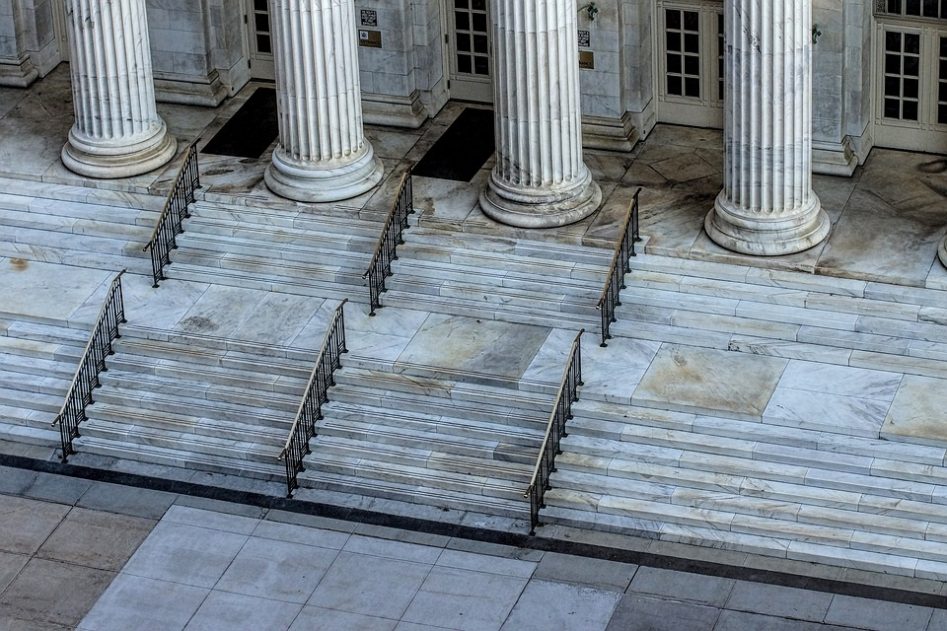Amsterdam, 5 april 2014 – In zijn afwijkende mening (dissenting opinion) laat Hooggerechtshof Rechter Breyer zich uit over de wetten die de campagne financiering in de VS aan banden leggen. In de zaak McCutcheon et al v. Federal Election Commission ging het om het recht om deel te nemen in een democratie door middel van financiële bijdragen. Dit recht wordt beschermd door het Eerste amendement van de grondwet van de Verenigde Staten, maar is niet absoluut.
Er zijn twee beperkingen op dit recht: “Base limits restrict how much money a donor may contribute to a particular candidate or committee while aggregate limits restrict how much money a donor may contribute in total to all candidates or committees.” Vanwege die laatste geaggregeerde limiet wendde McCutcheon zich tot de rechter; deze weerhield hem ervan naast de 16 kandidaten die hij reeds – netjes binnen de basis limiet – steunde, nog 12 andere kandidaten te steunen. Bovendien wenst hij dit in de toekomst opnieuw te doen.
Hoewel de VS regering meent dat de geaggregeerde limiet, evenals de basis limiet, is ingesteld om corruptie te bestrijden (de geaggregeerd is nodig om het omzeilen van de basis limiet te voorkomen), beslist de meerderheid van het Hooggerechtshof: “that the aggregate limits do little, if anything, to address that concern, while seriously restricting participation in the democratic process. The aggregate limits are therefore invalid under the First Amendment.”
Rechter J. Breyer kan zich hier in het geheel niet in vinden. Hij meent: “The conclusion [of the majority] rests upon its own, not a record-based, view of the facts. Its legal analysis is faulty: It misconstrues the nature of the competing constitutional interests at stake. It understates the importance of protecting the political integrity of our governmental institutions. It creates a loophole that will allow a single individual to contribute millions of dollars to a political party or to a candidate’s campaign. (…) [It] eviscerates our Nation’s campaign finance laws, leaving a remnant incapable of dealing with the grave problems of democratic legitimacy that those laws were intended to resolve.”
Wij vinden met name zijn overweging met betrekking tot (de schijn van) corruptie interessant. Hij legt glashelder uit waarom transparantie van partijfinanciering noodzakelijk is om corruptie effectief te bestrijden:
“What has this to do with corruption? It has everything to do with corruption. Corruption breaks the constitutionally necessary ‘chain of communication’ between the people and their representatives. It derails the essential speech-to-government-action tie. Where enough money calls the tune, the general public will not be heard. Insofar as corruption cuts the link between political thought and political action, a free marketplace of political ideas loses its point. That is one reason why the Court has stressed the constitutional importance of Congress’ concern that a few large donations not drown out the voices of the many. (…)
That is also why the Court has used the phrase ‘subversion of the political process’ to describe circumstances in which ‘[e]lected officials are influenced to act contrary to their obligations of office by the prospect of financial gain to themselves or infusions of money into their campaigns.’ (…)
The ‘appearance of corruption’ can make matters worse. It can lead the public to believe that its efforts to communicate with its representatives or to help sway public opinion have little purpose. And a cynical public can lose interest in political participation altogether. (…) Democracy, the Court has often said, cannot work unless ’the people have faith in those who govern.’ (…)
The upshot is that the interests the Court has long described as preventing ‘corruption’ or the ‘appearance of corruption’ are more than ordinary factors to be weighed against the constitutional right to political speech. Rather, they are interests rooted in the First Amendment itself. They are rooted in the constitutional effort to create a democracy responsive to the people – a government where laws reflect the very thoughts, views, ideas, and sentiments, the expression of which the First Amendment protects. Given that end, we can and should understand campaign finance laws as resting upon a broader and more significant constitutional rationale than the plurality’s limited definition of ‘corruption’ suggests. We should see these laws as seeking in significant part to strengthen, rather than weaken, the First Amendment. To say this is not to deny the potential for conflict between (1) the need to permit contributions that pay for the diffusion of ideas, and (2) the need to limit payments in order to help maintain the integrity of the electoral process. But that conflict takes place within, not outside, the First Amendment’s boundaries.
Since the kinds of corruption that can destroy the link between public opinion and governmental action extend well beyond those the plurality describes, the plurality’s notion of corruption is flatly inconsistent with the basic constitutional rationale I have just described. Thus, it should surprise no one that this Court’s case law (Citizens United excepted) insists upon a considerably broader definition.
In Buckley, for instance, the Court said explicitly that aggregate limits were constitutional because they helped ‘prevent evasion … [hrough] huge contributions to the candidate’s political party,’ (…). Moreover, Buckley upheld the base limits insignificant part because they helped thwart ’the appearance of corruption stemming from public awareness of the opportunities for abuse inherent in a regime of large individual financial contributions.’ (…) And it said that Congress could reasonably conclude that criminal laws forbidding ’the giving and taking of bribes’ did not adequately ‘deal with the reality or appearance of corruption.’ (…) Bribery laws, the Court recognized, address ‘only the most blatant and specific attempts of those with money to influence governmental action.’ (…) The concern with corruption extends further.
Other cases put the matter yet more strongly. In Beaumont, for example, the Court found constitutional a ban on direct contributions by corporations because of the need to prevent corruption, properly ‘understood not only as quid pro quo agreements, but also as undue influence on an officeholder’s judgment.’ (…)
There was an indisputable link between generous political donations and opportunity after opportunity to make one’s case directly to a Member of Congress.”
Transparency International Nederland pleit al enige jaren voor transparantere partij financiering. Niet alleen eventuele partijdigheid, maar ook de schijn van partijdigheid wordt hiermee voorkomen. Zoals Rechter Breyer mooi verwoordt: “Democratie werkt alleen wanneer burgers vertrouwen hebben in diegenen die hen besturen.”
Lees hier de uitspraak van het Amerikaanse Hooggerechtshof, inclusief de afwijkende mening van Rechter Breyer: MCCUTCHEON ET AL. v. FEDERAL ELECTION COMMISSION.

